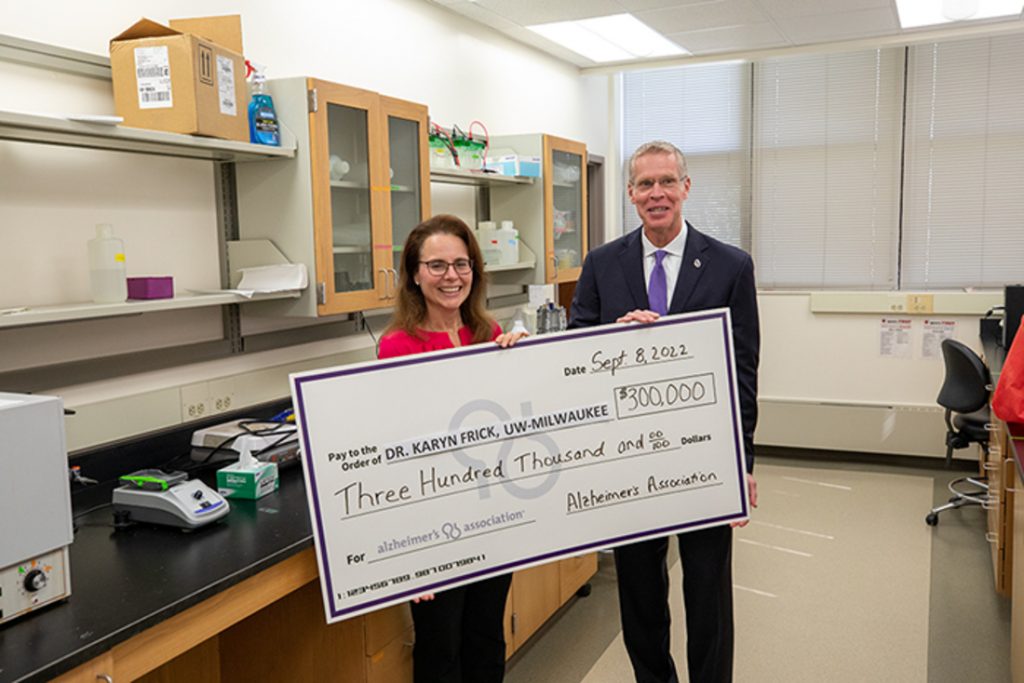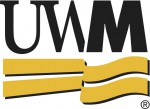Alzheimer’s Association grant funds University of Wisconsin-Milwaukee drug discovery for high-risk women
The role of estrogen in the Alzheimer’s puzzle

Karyn Frick, a distinguished professor of psychology at UWM, and David Grams, executive director of the Alzheimer’s Association Wisconsin Chapter, hold a giant check reflecting the amount of a research grant. (UWM Photo Services/Troye Fox)
MILWAUKEE _ Women are at a significantly higher risk than men of developing Alzheimer’s disease. So are people who carry a particular variant of a gene that everyone has, called APOE.
With a $300,000 research grant from the Alzheimer’s Association, a team of scientists, led by Professor Karyn Frick at the University of Wisconsin-Milwaukee, will dive into why women with two variants of the APOE gene are more protected from Alzheimer’s when they take estrogen therapy, while those with a third variant aren’t.
Estrogen therapy reduces the odds for some women, but not for others. Previous research has shown that one of the APOE gene’s three variants, dubbed E4, shows resistance to estrogen’s brain benefits. The other variants, E2 and E3, are not resistant to estrogen therapy.
The researchers’ aim is to find the most effective estrogen compound for each APOE variant to move into human clinical trials.
“We are excited to support this very important work being done by Dr. Frick and her colleagues,” said David Grams, executive director of the Alzheimer’s Association Wisconsin Chapter. “We are committed to investing in promising and innovative research and we’re proud that Wisconsin is home to scientists who are dedicated to helping us find a cure for this devastating disease.”
“All people carry two APOE variants in different combinations,” Frick said, “So risk would be different depending on whether a woman carries the E3/3, E3/4 or E4/4 variants.”
Using an Alzheimer’s mouse model developed by another team member, Mary Jo LaDu of the University of Illinois at Chicago, the researchers will compare oral treatment of a potent estrogen called estradiol along with two novel estrogen compounds on mice that have the APOE variants E3/4 and E4/4.
APOE is a gene that’s responsible for transporting cholesterol and other types of fats – or lipids – to cells where they can be used or disposed of. Exactly how it’s involved in women’s risk of Alzheimer’s is not fully understood, but the Frick team is working on a hypothesis.
“We think the reason is that E4 doesn’t do as good a job of clearing lipids and carrying them into cells as E3 and E2 do,” Frick said.
That’s important because both the hormone estrogen and amyloid, a toxic protein that builds up in the Alzheimer’s brain, are lipids, she said.
Many women are reluctant to take hormone therapy, whether it be for memory protection or to ease bothersome menopausal symptoms, because estrogen therapy can increase the risk of breast or uterine cancer and cardiovascular disease for some people. With colleagues from Concordia University Wisconsin and Marquette University, Frick formed the startup Estrigenix Therapeutics, Inc., with the goal of developing drug compounds that provide the benefits of estrogens without harmful side effects.
Her research team will be testing one of Estrigenix’s compounds with this funding, which may provide a new avenue for developing treatments that reduce Alzheimer’s risk in women of multiple APOE variants.
The Alzheimer’s Association is the largest nonprofit funder of Alzheimer’s research in the world, investing over $310 million in more than 950 projects in 48 countries.
NOTE: This press release was submitted to Urban Milwaukee and was not written by an Urban Milwaukee writer. While it is believed to be reliable, Urban Milwaukee does not guarantee its accuracy or completeness.






















